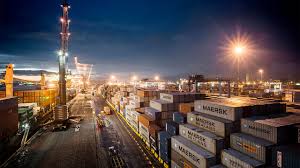Nigerian Shippers Council Seeks Abia Support To Realisation Isiala Ngwa Inland Dry Port
The Nigerian Shippers Council (NSC), the regulatory authority overseeing ports and maritime activities in Nigeria, has reaffirmed its unwavering commitment to the realisation of the critical Isiala Ngwa Inland Dry Port (IDP) project in Abia State. This initiative is part of the federal government’s broader port reform agenda aimed at decentralising port services and bringing them closer to inland commercial centres.
Progress and Challenges
The IDP, located in Isiala Ngwa South Local Government Area, was gazetted in 2006 and concessioned to Eastgate Container Terminal Limited. Notably, it holds the distinction of being the only inland dry port in Nigeria granted a 30-year concession period, emphasising its strategic importance. However, despite its potential, the project has faced prolonged delays, with only about 10% completion to date. Infrastructure deficits, delayed fulfilment of stakeholder obligations, and other logistical challenges have stymied progress for nearly two decades.
Strategic Significance
According to Akutah Pius Ukeyima, NSC’s Executive Secretary and CEO, with renewed commitment and effective leadership, the port can transform Abia State into a major logistics hub within southeastern Nigeria and beyond. The project promises numerous economic benefits, including:
- Access to global markets for Aba’s diverse industrial clusters and SMEs
- Creation of thousands of direct and indirect jobs across logistics, warehousing, transportation, and related sectors
- An increase in Abia’s internally generated revenue through trade volume growth
- Enhanced regional trade under the African Continental Free Trade Area (AfCFTA)
Ukeyima emphasised that the IDP can serve as a vital link for exporting agro-commodities, textiles, leather, and other non-oil goods, promoting economic diversification and boosting foreign exchange earnings.
Federal and State Collaboration
Governor Alex Otti of Abia State, who welcomed the NSC delegation, expressed concern about the lengthy delay in operationalising the dry port and called for urgent federal intervention—particularly in addressing critical transport infrastructure gaps, such as the absence of a rail network.
“Transportation is the major bottleneck,” Governor Otti remarked, highlighting the need for efficient rail connectivity to make inland ports viable. Despite ongoing federal investments, concerns over track gauge and execution efficiency remain barriers that need addressing.
He pledged his administration’s support and indicated readiness to engage with federal authorities, including planning a trip to Abuja, to facilitate high-level discussions for swift resolution. The governor also underscored that for the inland port to succeed, the patronage of importers and exporters must be ensured, emphasising the importance of turning strategic initial concepts into tangible infrastructure.
Moving Forward
The project’s revival requires collective effort and decisive action at both the federal and state levels. With proper infrastructure support, institutional backing, and effective coordination, Abia State has the potential to position itself as a key continental trade gateway, particularly under the AfCFTA framework.
The Nigerian Shippers Council’s renewed focus on this project underlines its significance in regional economic development, industrial growth, and job creation for southeastern Nigeria and landlocked neighbouring countries like Chad and Niger.



